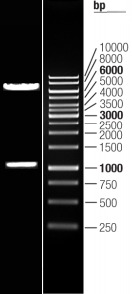Loxl2 (BC086801) Mouse Tagged ORF Clone
CAT#: MR206152L3
- LentiORF®
Lenti ORF clone of Loxl2 (Myc-DDK-tagged) - Mouse lysyl oxidase-like 2 (cDNA clone MGC:102220 IMAGE:30605240)
"BC086801" in other vectors (4)
Interest in protein/lysate? Submit request here!
Specifications
| Product Data | |
| Type | Mouse Tagged ORF Clone |
| Tag | Myc-DDK |
| Symbol | Loxl2 |
| Synonyms | 1110004B06Rik; 4930526G11Rik; 9430067E15Rik |
| Vector | pLenti-C-Myc-DDK-P2A-Puro |
| E. coli Selection | Chloramphenicol (34 ug/mL) |
| Mammalian Cell Selection | Puromycin |
| Sequence Data |
The ORF insert of this clone is exactly the same as(MR206152).
|
| Restriction Sites | SgfI-MluI Cloning Scheme for this gene |
| ACCN | BC086801 |
| ORF Size | 1179 bp |
| OTI Disclaimer | Due to the inherent nature of this plasmid, standard methods to replicate additional amounts of DNA in E. coli are highly likely to result in mutations and/or rearrangements. Therefore, OriGene does not guarantee the capability to replicate this plasmid DNA. Additional amounts of DNA can be purchased from OriGene with batch-specific, full-sequence verification at a reduced cost. Please contact our customer care team at custsupport@origene.com or by calling 301.340.3188 option 3 for pricing and delivery. The molecular sequence of this clone aligns with the gene accession number as a point of reference only. However, individual transcript sequences of the same gene can differ through naturally occurring variations (e.g. polymorphisms), each with its own valid existence. This clone is substantially in agreement with the reference, but a complete review of all prevailing variants is recommended prior to use. More info |
| OTI Annotation | This clone was engineered to express the complete ORF with an expression tag. Expression varies depending on the nature of the gene. |
| Product Components | The ORF clone is ion-exchange column purified and shipped in a 2D barcoded Matrix tube containing 10ug of transfection-ready, dried plasmid DNA (reconstitute with 100 ul of water). |
| Reconstitution | 1. Centrifuge at 5,000xg for 5min. 2. Carefully open the tube and add 100ul of sterile water to dissolve the DNA. 3. Close the tube and incubate for 10 minutes at room temperature. 4. Briefly vortex the tube and then do a quick spin (less than 5000xg) to concentrate the liquid at the bottom. 5. Store the suspended plasmid at -20°C. The DNA is stable for at least one year from date of shipping when stored at -20°C. |
| Reference Data | |
| RefSeq | BC086801, AAH86801 |
| RefSeq Size | 3351 bp |
| RefSeq ORF | 1181 bp |
| Locus ID | 94352 |
| Cytogenetics | 14 D2 |
| Gene Summary | Mediates the post-translational oxidative deamination of lysine residues on target proteins leading to the formation of deaminated lysine (allysine) (By similarity). Acts as a transcription corepressor and specifically mediates deamination of trimethylated 'Lys-4' of histone H3 (H3K4me3), a specific tag for epigenetic transcriptional activation (By similarity). Shows no activity against histone H3 when it is trimethylated on 'Lys-9' (H3K9me3) or 'Lys-27' (H3K27me3) or when 'Lys-4' is monomethylated (H3K4me1) or dimethylated (H3K4me2) (By similarity). Also mediates deamination of methylated TAF10, a member of the transcription factor IID (TFIID) complex, which induces release of TAF10 from promoters, leading to inhibition of TFIID-dependent transcription (By similarity). LOXL2-mediated deamination of TAF10 results in transcriptional repression of genes required for embryonic stem cell pluripotency including POU5F1/OCT4, NANOG, KLF4 and SOX2 (PubMed:25959397). Involved in epithelial to mesenchymal transition (EMT) via interaction with SNAI1 and participates in repression of E-cadherin, probably by mediating deamination of histone H3 (By similarity). During EMT, involved with SNAI1 in negatively regulating pericentromeric heterochromatin transcription (By similarity). SNAI1 recruits LOXL2 to pericentromeric regions to oxidize histone H3 and repress transcription which leads to release of heterochromatin component CBX5/HP1A, enabling chromatin reorganization and acquisition of mesenchymal traits (By similarity). Interacts with the endoplasmic reticulum protein HSPA5 which activates the IRE1-XBP1 pathway of the unfolded protein response, leading to expression of several transcription factors involved in EMT and subsequent EMT induction (By similarity). When secreted into the extracellular matrix, promotes cross-linking of extracellular matrix proteins by mediating oxidative deamination of peptidyl lysine residues in precursors to fibrous collagen and elastin (By similarity). Acts as a regulator of sprouting angiogenesis, probably via collagen IV scaffolding (By similarity). Acts as a regulator of chondrocyte differentiation, probably by regulating expression of factors that control chondrocyte differentiation (PubMed:21071451).[UniProtKB/Swiss-Prot Function] |
Documents
| Product Manuals |
| FAQs |
| SDS |
Resources
Other Versions
| SKU | Description | Size | Price |
|---|---|---|---|
| MC217937 | Loxl2 (untagged) - Mouse lysyl oxidase-like 2 (cDNA clone MGC:102220 IMAGE:30605240), (10ug) |
USD 730.00 |
|
| MR206152 | Loxl2 (Myc-DDK-tagged) - Mouse lysyl oxidase-like 2 (cDNA clone MGC:102220 IMAGE:30605240) |
USD 420.00 |
|
| MG206152 | Loxl2 (GFP-tagged) - Mouse lysyl oxidase-like 2 (cDNA clone MGC:102220 IMAGE:30605240) |
USD 460.00 |
|
| MR206152L4 | Lenti ORF clone of Loxl2 (mGFP-tagged) - Mouse lysyl oxidase-like 2 (cDNA clone MGC:102220 IMAGE:30605240) |
USD 620.00 |
{0} Product Review(s)
Be the first one to submit a review






























































































































































































































































 Germany
Germany
 Japan
Japan
 United Kingdom
United Kingdom
 China
China

